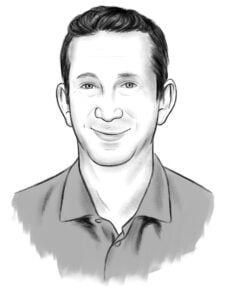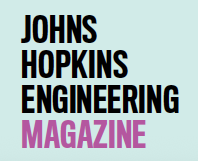As a child riding on the New York City subway, Ari Moskowitz, Engr ’94, was captivated by the colorful and iconic transit map. But what fascinated him most wasn’t the trains—it was the system itself. “It reminded me of the human body,” he recalls. “Vessels, organ systems, control mechanisms … everything working together to move something essential from one place to another.”

That early curiosity in how systems function laid the foundation for a career that has spanned biomedical innovation, medical device development, and now, global health advancement. As a deputy director at the Gates Foundation, Moskowitz works with industry and clinical leaders, heading a portfolio of investments and a talented team focused on medical devices and AI—tools that are transforming the way primary health care is delivered in underserved communities around the world.
Moskowitz arrived at Johns Hopkins at age 16, drawn to a biomedical engineering major by a love of problem solving. His hands-on work in a materials science lab, helping develop an artificial hip simulator under the mentorship of former professor James Wagner, Med ’78 (MS), Engr ’85 (PhD), gave him an early taste of how research, building, and testing can directly impact patient care.
That theme continued throughout his career, from developing resorbable stents and brain shunt systems, to leading diagnostic imaging programs at Boston Scientific, and even living in Ireland and Japan to identify novel technologies, support global product launches, and forge strategic partnerships.
But it was his pivot to the Gates Foundation in 2022 that marked a profound shift in focus from product innovation from high-income markets to systems transformation for the world’s most vulnerable populations.
In this role, he works across an expert peer group focused on the maternal and newborn health space, spanning data, nutrition, microbiome, diagnostics, and drug product innovation and introduction. The medical devices and AI portfolio he heads encompasses approximately $200 million in global investments. The primary aim, he notes, is reducing mortality and morbidity in low- and middle-income countries through pregnancy risk stratification.
“Many low- and middle-income countries don’t need more specialized tech; they need accessible, affordable tools that nonspecialists can use effectively,” Moskowitz says.
One example is a handheld ultrasound tool that replaces bulky, expensive hospital systems with an easy-to-use device designed for nurse midwives in community clinics. Based on simple sweeps of the pregnant patient, it uses software to automatically assess gestational age, fetal health, and risk factors without requiring imaging expertise.
Another part of his team is working on wearable devices for risk monitoring during labor. Once the innovations are developed, Moskowitz and his team of four program officers plus regional advisers work with companies and governments to make sure they can be supplied and serviced at a reasonable cost.
The challenge is sustainability. “If a health ministry can’t afford it, we haven’t succeeded. We’re working at the intersection of engineering, policy, and economics to make these solutions more viable and easier to adopt,” he says.
“Many low- and middle-income countries don’t need more specialized tech; they need accessible, affordable tools that nonspecialists can use effectively.”
— Ari Moskowitz
Moskowitz says it’s the systems mindset, nurtured at Johns Hopkins, that ties it all together. “The problems are complex, but solvable. And increasingly, fields are converging to create entirely new solutions. I still love figuring out how parts connect to serve something bigger. That’s how we will equalize health care.”
— HEATHER LOWE
illustration by Joe Kimmel

